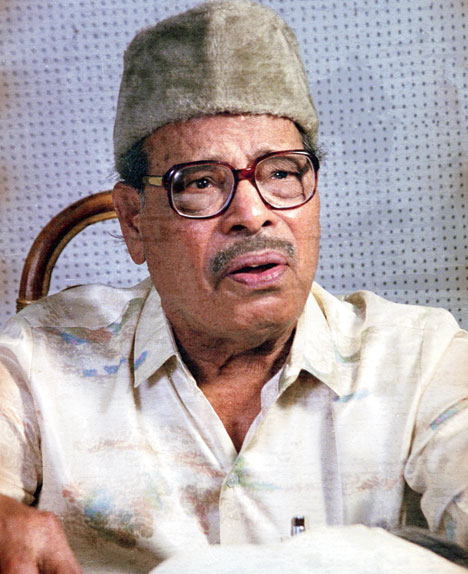
was on May 1
• Characters from Manna Dey's ode to nostalgia Coffeehouser shei addata aj ar nei came to life for an hour at BH Block community hall. Members of BH Park Morning Walkers’ Garden Club had crafted a play out of Suparnakanti Ghosh’s lyrics celebrating College Street’s famous intellectual hub where conversation brews over steaming cups of coffee.
The audience was transported back to the 70s when seven friends Nikhilesh, Moidul, D'Souza, Rama Roy, Amal, Subimal and Sujata spent their late afternoons at a table in Coffee House, discussing all from Bishnu Dey to Jamini Roy.
In the play, Manna Dey comes on stage as singer-narrator, introducing all the characters through his song.
Once he exits, Abdul Karim, a waiter, introduces himself as one who has spent years in the Coffee House serving people from different walks of life. Gradually the main cast members enter. The conversation veers towards the day's newspaper headline on the stabbing of Forward Bloc leader Hemanta Basu.
This is how contemporary landmarks are touched upon, be it the Uttam Kumar vs Soumitra Chatterjee debate, or Pramothesh Barua in the film Debdas. The industrial and political scenario is discussed too.
“We introduced new characters like Keya to add a twist to the story,” said Dipali Chatterjee, the writer and director of the play. In the last scene, Keya appears. She is the sole bread-earner of the family and appeals to the group for financial help.
“We used to get little pocket money in our college days but it would be enough for tea and pakora at Coffee House,” said Mitali Mitra, who played Keya. “This play was our tribute to the historic centre of intellect. We are also glad we could get so many senior citizens to perform on stage.”
Bharati Kanjilal

Bag Rahasya
Play on banknotes
• The audience was transported back to November 8, 2016 as a playback of Prime Minister Narendra Modi’s voice announced demonetisation. They were at Rabindra Tirtha watching the play Bag Rahasya by drama group New Town Srutighar.
The play, set during demonetisation, followed the trails of a poor man Ashok, played by Partha Pratim Gupta.
The play begins with a businessman (played by Tufan Adhikari) crestfallen at Modi’s announcement. He then packs all his black money into a suitcase and the next morning takes it to a park where he manages to leave it with Ashok.
Though reluctant to take the bag, circumstances compel Ashok to do so. At home, he opens the bag to find crores of rupees inside.
His wife (Shubhra Majumdar) starts dreaming of buying jewellery, daughters (Gargi Chakraborty and Sree Mukherjee) start dreaming of holidaying in Darjeeling but Ashok himself is uneasy. Eventually his wife falls ill and needs an expensive operation to save her life. The rest of the play is about whether or not the family uses the money.
“A rich man wouldn’t have thought twice before spending the cash but it is the poor who still have a conscience,” said Gupta, who is the president of the drama group as well as the play’s writer and director. “I had written this play within a week of demonetisation as I could see the impact it had on everyone.”
Such was his foresight that Gupta had even bought 50 wallets that were modelled on Rs 500 and Rs 1000 notes that had become popular right after demonetisation. They were cut up and used as notes in the play.
“We began our drama group in 2012,” said Anjan Sarkar, who played an honest policeman in the play. “We had all come to New Town from different parts of town and were drawn together by our love for theatre.”
Spiritual message
• Sri Sri Sarada Sangha, Bidhannagar, hosted a programme at Rabindra Okakura Bhavan where Swami Ishatmananda of Vivekananda Vedanta Society of Chicago delivered a lecture.
The programme was inaugurated with chanting of Vedic mantras and a chorus by the members. Thereafter girls from CF Block’s Ideal School for the Deaf performed dandiya dance.
Swami Ishatmananda then spoke on the subject “Religion in the light of Sri Ramakrishna”.
“In The Mahabharata, religion is referred to as spiritual epiphany and upliftment. Man cannot survive without religion just as fish cannot survive without water. But if the water gets stagnant even the fish will not survive,” he said.
Ramakrishna had said that religion means performing all kinds of duties. “Do your duty with one hand and with the other hold God. Lose your ego. Ego and ignorance are the cause of all suffering. Devotion means purification of the mind and overcoming all kinds of selfishness.”
The monk shared the story of King Midas, who had asked for and received the boon to turn everything he touched, to gold. “While he thought this would make him the richest man on earth, he ended up touching his daughter and turning her into the inanimate metal too. So be careful what you pray for,” he said.
He cited stories from The Mahabharata, such as when Arjuna and Duryodhana went to seek help from Krishna to fight in the Kurukshetra war. “Due to his ego, Duryodhana sat near Krishna’s head but Arjuna sat at his feet. So Krishna sent his army to fight for the former but he himself stayed with Arjuna,” he explained.
Ishatmananda concluded his speech by asking the audience to spread the message of Ramakrishna in society. “The initiative taken by the members of Sarada Sangha to spread spiritual knowledge is praiseworthy and this is the best offering to God.”
Bharati Kanjilal
WRITE IN on problems or issues related to the township and respond to articles appearing in this weekly tabloid to
The Telegraph Salt Lake, 6, Prafulla Sarkar Street, Calcutta - 700001 or e-mail to saltlake@abpmail.com










